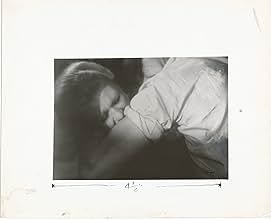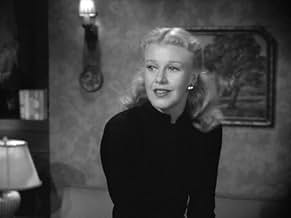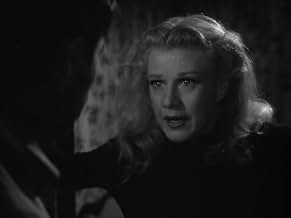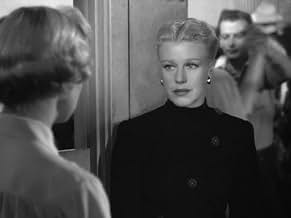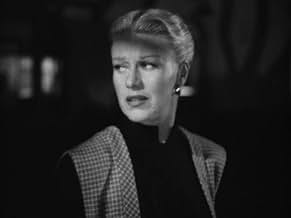Marsha Mitchell, se detiene en un pueblo sureño para ver a su hermana, que se ha casado con un Ku Klux Klan. Marsha es testigo de cómo se comete un asesinato y ayuda al fiscal del distrito a... Leer todoMarsha Mitchell, se detiene en un pueblo sureño para ver a su hermana, que se ha casado con un Ku Klux Klan. Marsha es testigo de cómo se comete un asesinato y ayuda al fiscal del distrito a llevar a los criminales ante la justicia.Marsha Mitchell, se detiene en un pueblo sureño para ver a su hermana, que se ha casado con un Ku Klux Klan. Marsha es testigo de cómo se comete un asesinato y ayuda al fiscal del distrito a llevar a los criminales ante la justicia.
- Dirección
- Guionistas
- Elenco
- Reporter
- (sin créditos)
- Mrs. Rainey
- (sin créditos)
- Townsman on Courthouse Steps
- (sin créditos)
- Interne
- (sin créditos)
- Jury Foreman
- (sin créditos)
- Dirección
- Guionistas
- Todo el elenco y el equipo
- Producción, taquilla y más en IMDbPro
Opiniones destacadas
Director Heisler really knows his way around crowds. The boisterous scenes in the bowling alley and liquor lounge are electric with vitality and look nothing like a bunch of Hollywood extras. At the same time, Jerry Wald was a major producer at Warner's and I expect it was he who made sure the small town ambiance is as authentic as it is. There are elements here that suggest a project somewhere between A and B levels of production.
Catch those earmarks of noir in just the first few minutes—the all-night bus, the train whistle, the dampened streets, and the lonely diner. Right away a menacing universe is defined for us. But oddly, this is a KKK film that never once mentions race and shows, by my count, only one black person. Odd for a drama, which by implication takes place in the deep South. My guess is that the writers Brooks and Fuchs wanted to show that the Klan is not only a menace to Blacks, but Whites, as well.
It's a fairly plausible script, though how a DA (Reagan) could get elected with such out- spoken anti-Klan views remains a stretch. What really works, in my book, is the chemistry between the sisters (Day & Rogers). Not only do they look alike, but there's genuine warmth between them. Thus, it's no stretch to think that Marsha (Rogers) would do nothing to jeopardize Lucy's (Day) happiness. And how visually right Cochran is for his part as the blue-collar Romeo, though his sniveling seems overdone at times.
I really like the way the screenplay embeds the Klan in the very fabric of the town. These are not ordinary hoodlums despite their violent activities, and a bolder script would have shown more fully what the attraction of the Klan was for these townsfolk (there's one loaded mention of making sure women can walk safely down the street). There were a number of these racially charged dramas during this period—No Way Out (1950), The Well (1951), Lost Boundaries (1949)—and all are strong dramas, including this one. However, the McCarthy purges soon put an end to social problem films for the remainder of the decade, and now they await rediscovery by fresh generations. This is one of them.
In "Storm Warning" the Klan is variously referred to as a "mob," "hoodlums in sheets," and a "gang," According to D.A. Ronald Reagan, it is a "private money-making racket" controlled by a few for personal profit. These are terms normally associated with a criminal conspiracy such as the Mafia. No mention is made of the Klan's racism, anti-Semitism, or anti-Catholic biases.
The only prejudices specifically expressed by Klan members are directed against such vague generic groups as "busybodies," "troublemakers," and "outsiders." With the exception of a scattered sparse handful of anonymous black extras, (who may not even be Rock Point residents), among the many hundreds outside the courthouse, this would seem to be a town without minorities.
The town's location is also fudged. Although non-Klan members are resentful of Washington, New York, and those from "Up North," no one in town speaks with any type of regional Southern accent or utilizes any Southern colloquialisms. There are no cultural references to Southern life or history. People in Rock Point eat hamburgers, not grits. It looks like California orange country, and it indeed was filmed in Corona, California.
Even though the film's trailer mentions the KKK, the actual words "Ku Klux Klan" are not used in the film. What emerges is a softened, quasi-generic illegal organization known simply as "The Klan." Warner Brothers was on the cutting edge of socially conscious films in the 1930's, but by the late 40's and early 50's, were behind the curve on tackling anti-Semitism and race hatred. Clearly the studio had second thoughts about offending their Southern consumer base and blunted the edge of what could have been a courageous statement on race relations in America.
Another downside is the writers' obvious cribbing from "Streetcar Named Desire." Not only are character dynamics of this film's domestic triangle lifted from the Williams classic, but even minor details are shamelessly copied. Steve Cochrane's Stanley-like character, referred to as "stupid" and an "ape," introduces himself to his sister-in-law in a stained T-shirt, wonders who has been stealing his liquor, cries like an immature child, excels at bowling, enjoys a strong sexual chemistry with his pregnant wife, causes his sister-in-law to primp up in anticipation of meeting him, and later attempts to rape her in the climactic scene.
One wonders why Warners was not sued for plagiarism, but as the studio had released "The Glass Menagerie" in 1950 and "Streetcar" in 1951, it's probable that Williams gave at least tacit permission for the use of his intellectual property.
Despite these complaints, there are some very good things in "Storm Warning." Journeyman director Stuart Heisler easily does the best work in his career. He invests "Storm Warning" with a strong Noir sensibility and utilizes his chiaroscuro lighting to great advantage on the rain-soaked streets of Rock Point to create some strikingly unusual imagery. The scene of Ginger Rogers vomiting behind a telephone poll after witnessing the murder is startling effective for a film of this period.
Heisler also utilizes the big crowds very skillfully in spite having to use many non-professionals as extras. This is especially true in the critical street scene outside the courthouse and his well-framed compositions during the climactic Klan rally.
His direction of Steve Cochrane as the none-too-bright Hank Rice character is commendable. Cochrane's "business" of tugging his floppy white socks up his exposed legs while sitting on a grain bag in ill-fitting pants, dutifully awaiting audience with his Klan superiors is perfect iconography for his infantile, shallow persona. In fact, the entire cast is well-handled by the director, and ubiquitous character actor Hugh Sanders has the best role of his prolific career as the Klan leader.
"Storm Warning" turned out to be the last real quality role of Reagan's career before his slow decline as star with films like "Bedtime for Bonzo" and TV work like "Death Valley Days." The Gipper acquits himself very well in the only political-themed film of his career as the principled, crusading District Attorney and foreshadows his future role in national politics.
Although "Warning" can still hold its own as period melodrama, it missed the streetcar in making a serious, socially conscious comment on racism in American society.
Ginger Rogers witnesses a lynching by the Klan. When two of the men remove their hoods, she recognizes one of them as her brother-in-law, husband to her pregnant sister, played by Doris Day. Reagan is the honest DA intent on getting to the bottom of the lynching - the guy who was lynched was a reporter doing investigative journalism, jailed on a trumped up DUI. The heads of the local Klan are worried about all of this, not because of their nocturnal activities, but because they have been using the Klansmen and bilking them of their money for dues, insignia, etc. Grifters using the naivete and prejudices of a mob of rubes to enrich themselves? Suddenly this film is getting quite timely.
The film as a whole has a very dark element throughout, fittingly, but surprising for its time. Bringing the Ku Klux Klan to the forefront of American cinema in pre-civil rights days, handled as well as it is here, makes for a very interesting, gripping and entertaining film.
So many actors of Hollywood's Golden Age were typecast in familiar roles, but seeing these stars sink their teeth into a well-written screenplay and a deftly directed movie is a real treat.
¿Sabías que…?
- TriviaThis was one of only a handful of straight-up dramas in which Doris Day ever appeared, and was her first (and only) film for Warner Brothers in which she did not sing a note. She accepted this role partly for the opportunity to work with one of her childhood idols, Ginger Rogers.
- ErroresThe cabbie who declines to give Marsha a ride turns out to be a participant in the planned Klan lynching at the jailhouse, but he tells her to walk to the Recreation Center just 10 blocks away, knowing that she would need to pass the jailhouse on the way and possibly witness the crime. He could easily have driven her to her destination in a few minutes and still would have had plenty of time to drive back to the jailhouse to participate in the reporter's murder.
- Citas
Burt Rainey: Just wearing that hood doesn't change your voice, Walker. Am I supposed to be afraid of you because your face is covered up? It'll take more than these sheets you're wearing to hide the fact that you're mean, frightened little people, or you wouldn't be here, desecrating the cross.
Charlie Barr: In the name of the imperial Klan...
Burt Rainey: Don't give me that Halloween routine.
- ConexionesFeatured in Biography: Doris Day: It's Magic (1998)
- Bandas sonorasKiss Me Sweet
(uncredited)
Music by Milton Drake
Played when Marsha first goes to the recreation center
Selecciones populares
- How long is Storm Warning?Con tecnología de Alexa
Detalles
- Tiempo de ejecución1 hora 33 minutos
- Color
- Relación de aspecto
- 1.37 : 1
Contribuir a esta página



